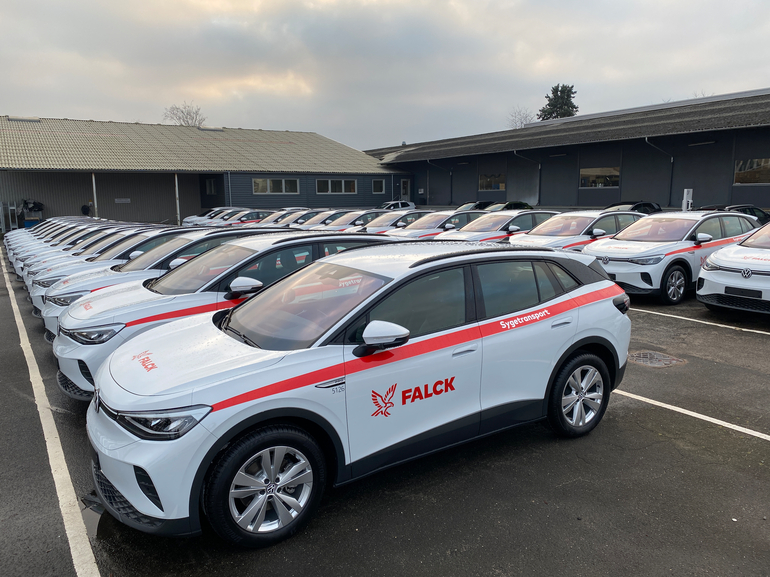Falck is in the process of converting its seated patient transport to a greener fleet with the purchase of 50 new electric cars. The new electric cars will drive Danes to health appointments, for example, doctor, dentist, physiotherapist or hearing clinic. Falck operates a major contract for the Capital Region of Denmark, which already includes 10 electric cars for seated patient transport, and now 50 more are coming to service Falck's customers with a subscription within health and transport.
100% electric car policy
Falck has introduced a 100% electric car policy in Denmark. This means that all new passenger cars ordered by Falck will run on electricity. The passenger cars in Falck include 130 passenger cars from Falck stations, 360 cars for seated patient transport and 130 company cars. Passenger cars in Denmark make up 56% of Falck's total global fleet of passenger cars. The transition to electric cars is also under way in Falck's other markets.
Falck's goal is that in Denmark in 2026 at least 90% of the passenger cars for seated patient transport will be converted to electricity, in addition to all company and station cars.
"At Falck, we want to contribute to improving people's health and well-being with the least possible impact on the environment and the society around us. Falck's greatest direct impact on the environment stems from the fuel consumption of our fleet. Therefore, it is a good start that we now have 50 new electric cars on the road. The cars have already been well received by both our employees and our customers,"
says Michala Fischer-Hansen, Executive Vice President of Consumer and Technical Services at Falck.
50% reduction of direct CO2 emissions by 2030
The new electric cars are just one of the initiatives that Falck has initiated to ensure a green transformation of the group. In June 2022, Falck will also deploy three electric roadside assistance vehicles in Denmark. The cars are built for easier roadside assistance and are of the Mercedes eVito Tourer type.
With one of the world's most advanced ambulance services in Europe and the US, Falck has an increased focus on how the CO2 footprint is reduced from heavier vehicles such as ambulances, which globally account for 80% of Falck's direct CO2 emissions. In the long term, Falck has an ambition to convert its ambulances to electricity, or other renewable energy sources, when the technology is ready. Falck expects that the first prototype of an electric ambulance will be ready for testing in the Capital Region later in 2022. At Falck, targeted work is also being done on prevention and innovation, which means that fewer patients need to be picked up by an ambulance.
"The green transition at Falck is both about reducing CO2 emissions for our existing services, and about rethinking how we deliver our services in a more sustainable way for the benefit of both the climate and those who need our help. We work with health drones that can replace driving transport, we make research into technologies that can prevent hospitalisations and we constantly challenge how we can create more sustainable deliveries and solutions,”
says Jakob Riis, CEO of Falck.
Falck has a goal of reducing its own direct CO2 emissions by 50% from 2021 to 2030 and intends to commit to the Science Based Targets initiative by 2022.



